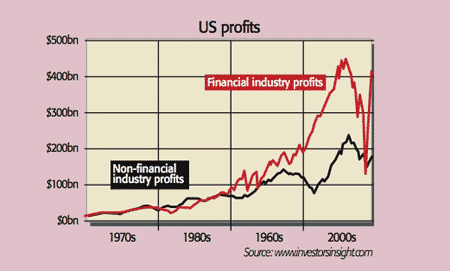Get the latest financial news, insights and expert analysis from our award-winning MoneyWeek team, to help you understand what really matters when it comes to your finances.
You are now subscribed
Your newsletter sign-up was successful
Want to add more newsletters?

Twice daily
MoneyWeek
Get the latest financial news, insights and expert analysis from our award-winning MoneyWeek team, to help you understand what really matters when it comes to your finances.

Four times a week
Look After My Bills
Sign up to our free money-saving newsletter, filled with the latest news and expert advice to help you find the best tips and deals for managing your bills. Start saving today!
"The ghosts of bubbles past" have returned to haunt Wall Street, says Alan Abelson in Barron's. America's Securities and Exchange Commission has accused Goldman Sachs of securities fraud over how it structured and sold a collateralised debt obligation (CDO an instrument containing subprime mortgages bundled together) in 2007.
Goldman allegedly didn't tell investors in the CDO that a hedge fund, Paulson & Co, had been involved in choosing the derivatives that were included in the CDO. Paulson had taken out a short position against the CDO, and so would profit if it bombed, which it duly did.
This affair has created uncertainty in Wall Street, says The Economist. German and UK regulators are looking into the alleged mis-selling of the CDO, and insurance giant AIG which lost money insuring Goldman CDOs may now sue. Yet another jump in earnings, up by almost 100% year-on-year in the first quarter, kept the bank in the spotlight this week.
MoneyWeek
Subscribe to MoneyWeek today and get your first six magazine issues absolutely FREE

Sign up to Money Morning
Don't miss the latest investment and personal finances news, market analysis, plus money-saving tips with our free twice-daily newsletter
Don't miss the latest investment and personal finances news, market analysis, plus money-saving tips with our free twice-daily newsletter

But the potential ramifications go beyond Goldman alone. As John Mauldin says on Investorsinsight.com, "there's never just one cockroach". Given the sheer volume of CDOs across the industry, "if regulators look hard enough" they could surely find more evidence of "disreputable activity" in this area, says Nicholas Paisner on Breakingviews.
The really awkward point for the sector is that this comes just as law-makers are discussing a wide-ranging financial reform bill. The danger is that they will use this as "an excuse for punitive reforms", says Lex in the FT such as making banks hive off their derivatives operations. "A more aggressive push" towards financial regulation "is going to follow this news", says David Rosenberg of Gluskin Sheff.
So the industry's profitability looks set to be dented by regulators just at a time when financial industry profits, propped up by government guarantees, the steep yield curve and relaxed accounting standards, are contributing the lion's share of the recent increase in overall profits. Ex-financial earnings are up a mere 5% in the past 12 months.
As government stimuli fade and the inventory bounce wears off, non-financial profits are likely to look even less V-shaped. So post-Goldman, investors have another reason to be wary of a "seriously overextended and overpriced" market, says Rosenberg.
Get the latest financial news, insights and expert analysis from our award-winning MoneyWeek team, to help you understand what really matters when it comes to your finances.
MoneyWeek is written by a team of experienced and award-winning journalists, plus expert columnists. As well as daily digital news and features, MoneyWeek also publishes a weekly magazine, covering investing and personal finance. From share tips, pensions, gold to practical investment tips - we provide a round-up to help you make money and keep it.
-
 Three key winners from the AI boom and beyond
Three key winners from the AI boom and beyondJames Harries of the Trojan Global Income Fund picks three promising stocks that transcend the hype of the AI boom
-
 RTX Corporation is a strong player in a growth market
RTX Corporation is a strong player in a growth marketRTX Corporation’s order backlog means investors can look forward to years of rising profits

